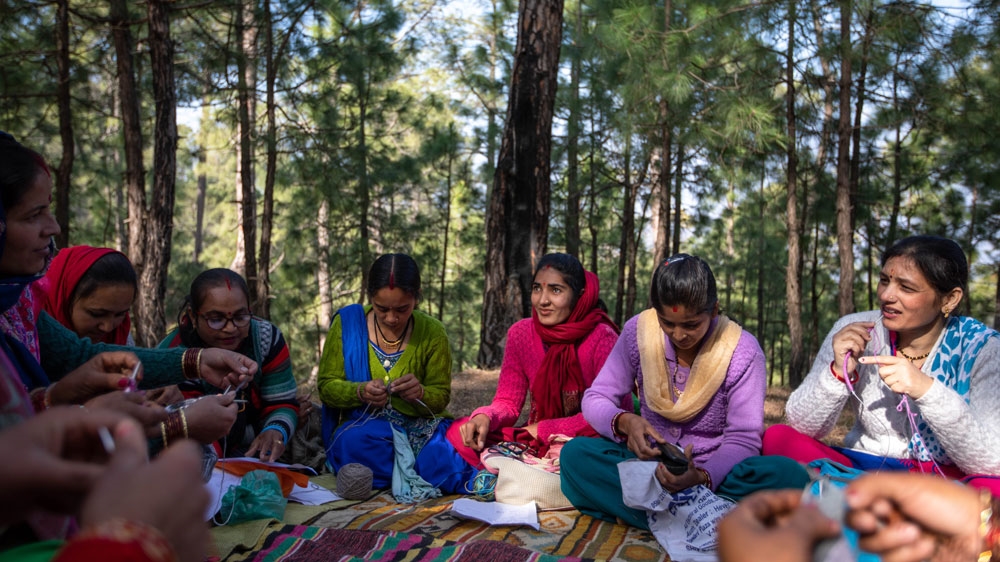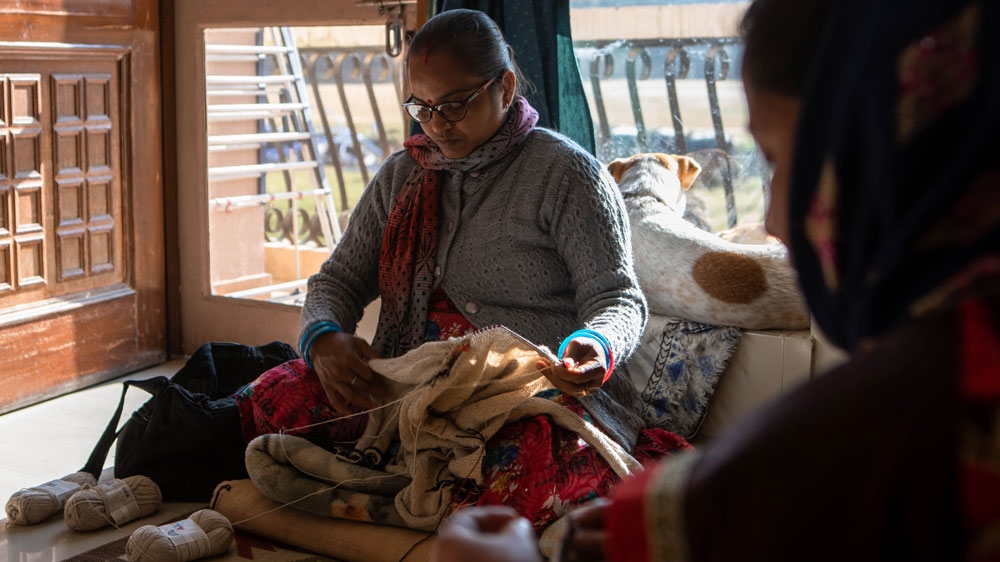
Uttarakhand, India – When seven women in the remote mountain village of Ranikhet first met Mala Srikanth, they stood with their heads down.
Srikanth was a divorcee, retired doctor, ex-military, single mother of two daughters – and wore jeans. In this northern Indian community, all of this was unfathomable.
The women had come from poor backgrounds and were there to knit.
In recent years, a quiet matriarchal revolution has been building at the foothills of the Himalayas, reshaping a system that has long dictated the lives of women. The change in Ranikhet and surrounding villages stems from a knitting circle.
Since forming five years ago, 14 women now meet every Wednesday morning in Srikanth’s home and knit perfectly – a feat achieved through months of training.
“They now come in their nicest clothes, heads held high and they walk with confidence,” said Srikanth.
For her, it is not enough to knit an item that will be sold with pity by an NGO, if at all – you knit to the highest standards, standards that she believes every woman should hold themselves to in their daily life as well.
As knitting needles flash between fingers, the women waste no time talking up a frenzy, interrupting each other and occasionally drowning out the chatter with laughter.
 |
|
Since forming five years ago, 14 women now meet regularly to for a knitting session [Maria de la Guardia/Al Jazeera] |
When the language changes from Hindi to local Garhwali, the topic becomes more serious. Conversations address taboo subjects, from birth control and alcoholism to sex and domestic violence.
“I have talked about things with these women that I have never told anyone before,” said knitter Gudiya Khan. “We wait the whole week for Wednesday to come so that we can meet everyone and share our experiences, our ups and downs in life.”
At home, she sits with old family photos strewn across her bed.
One shows her wedding day. Her grandmother’s hand rests on her blue veil before turmeric was applied to her forehead in a traditional ritual.
Married at 16 to a cousin twice her age, her life changed forever within months. As her alcoholic husband became increasingly abusive, his addiction pushed them deeper into poverty. Within a year, she gave birth to a baby boy in a nearby village home, underage and therefore unable to go to a government hospital.
Her health, her pain and her fears were forfeited to protect her husband.
The Uttarakhand State Commission for Women reports that one in two women are victims of domestic violence.
Suhela Khan, programme coordinator for UN Women India MCO, said: “Women’s rights are only considered to be women’s issues and are not being seen as a matter of human rights.”
In Ranikhet, though, female leadership is challenging patriarchy.
Gudiya Khan became a widow and single mother after her husband died from a brain haemorrhage resulting from alcohol abuse.
Twenty kilometres away, in a region where alcoholism is common among men, a used rum bottle sits on the bedside table of knitter Mamta Pandey, inside it, a clipping from a green-leafed plant struggles to grow.
Gudiya Khan and Pandey are two knitting circle members who became breadwinners for their families and are financially independent.
Transparency and independence
The group is independent of any organisation or NGO and sales are largely by word-of-mouth.
An online shop is planned for early 2019. Srikanth helped each member to open a personal bank account where their monthly salary is deposited; an amount summed up in neat hand-writing on lined, yellow pages of a hardback notebook kept that keeps a record of how much each woman produces weekly.
In an effort to encourage transparency, formal banking further eliminates any interference by husbands or male family members who attempt to claim the women’s earnings.
“Knitting has completely changed my life, said Gudiya Khan as she works on an oatmeal-coloured cushion cover.
Since meeting Srikanth five years ago, her single-room shack has been extended three-fold and sits atop the highest peak in her picturesque village.
Her sons, aged 19 and 17, are excelling in their education, paid for by the income her knitting has generated, and have vowed to never touch alcohol.
“Research shows that women spend 90 percent of what they earn on the health and education of her children and within her family. So thereby, they not only contribute to the betterment of their families but in turn contribute to the development of communities and society at large and generations to come,” said Suhela Khan of the UN programme.
There is little difference between sons and daughters today, with both contributing equally in everything, including earning money.
Deepa Bhatt, knitter
The Ranikhet knitting circle has led to multigenerational change.
At the session, with wide eyes and raised eyebrows, the knitters discuss the gender of babies.
In India, a central factor in femicide is the cost burden associated with daughters when it comes to dowries and marriage.
“There is little difference between sons and daughters today, with both contributing equally in everything, including earning money,” said knitter Deepa Bhatt.
Tongue in cheek, Neeru Srivastava added: “I have a son, but sometimes I feel it would have been better had I had a daughter.”
A day later, Pandey reflected on her abusive and confusing upbringing.
Through tears, she said: “I am now able to talk with my daughter openly about everything, which mothers were not able to in my generation.”
Her daughter has been guided on the changes her body will undergo during puberty, including periods, something Pandey had to learn about on her own. “Things I could not imagine discussing are now the new norm.”
With the exception of a young newlywed, none of the knitters has gotten pregnant since taking control of their bodies through the use of contraception and rates of domestic violence have been quelled.
“Now that I feel empowered and confident, I help others in my community and village as much as I can. I advise and guide, and they do listen,” Gudiya Khan said. “They go back and continue to help other women. There has been a chain reaction.”
 |
| With more women expressing interest in the group, Srikanth plans to initiate 16 additional knitters into the circle in 2019 [Maria de la Guardia/Al Jazeera] |
Pandey estimates that half of the women in her village, who are not part of the knitting circle, have become more outspoken and confident as a result of her example. “They think about the future and they think about the bigger picture – about saving more and doing something for themselves.”
The knitters have been able to send their children to school, extend and improve their homes and buy furniture and jewellery.
Each woman also contributes 200 rupees ($2.80) a month to a collective saving scheme. “If anyone is ever in need, they will loan out the money to that person on minimal interest rates,” said Gudiya Khan.
Suhela recognises that there have been backlashes in India against women who become financially independent and outspoken.
“It is not a simple issue. Despite progressive legislation and despite awareness for gender equality there is still a lot to be done,” she said.
The knitting circle has been spared from criticism or threats. Instead, women from the villages are embracing their newfound voices.
The greatest challenges came in the first few weeks of the circle forming.
Hindu women wouldn’t sit next to a Muslim, while those on their period were banished and higher castes refused tea made by lower castes. Srikanth made it clear that all women are equal. Today, there is a sense of an unbreakable sisterhood.
Gudiya Khan, the only Muslim in the knitting circle, said: “The life of a Hindu or a Muslim woman is the same because when you cry the tears are the same, the difficulties are the same. So, the life of a woman, no matter what religion, is the same.”
With more women expressing interest in the group, Srikanth plans to initiate 16 more individuals into the circle in 2019, recruited in sets of eight to ease the training period – all to be taught and overseen by the established members.
Srikanth said she had never intended to empower anyone or cause an uprising, she simply wanted to lead great knitters.
“We are equals. There is no ‘she versus us’,” says Srikanth, who has gone from being called “madam” to “didi”, or big sister.
 |
|
The knitters have been able to send their children to school, extend and improve their homes and buy furniture and jewellery [Maria de la Guardia/Al Jazeera] |












